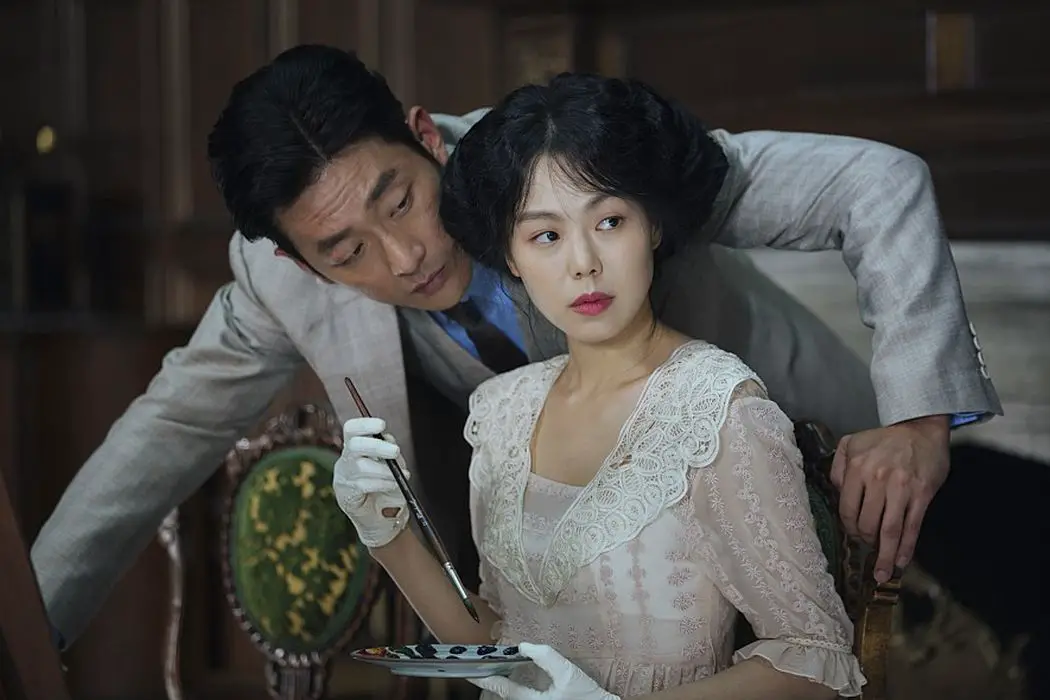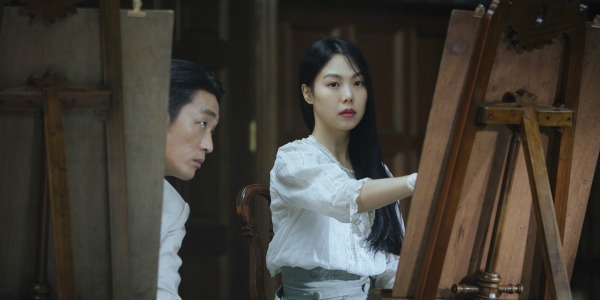THE HANDMAIDEN: A Forward-Thinking Period Piece

Alistair is a 25 year old writer based in Cambridge.…
Brian De Palma, cinema’s foremost Hitchc*ck imitator, always claimed that the master of suspense “distilled the very essence of film” and that he was the only then-contemporary director who could channel the master’s work for a modern audience.
De Palma may have been largely derided as a mere copycat in his heyday, but latter-day filmmakers are as likely to be influenced by his work as the films that inspired it; you only need to look at the suspenseful sleazy thrillers of David Fincher, or the tightly wound sexual narratives of Pedro Almodóvar to recognise this.
Korea’s Master of Suspense
Korean director Park Chan-Wook is arguably the only filmmaker who manages to coherently curate the disparate elements that made each aforementioned director the “master of suspense” at the peak of their popularity, all the while creating something distinctive that bears little comparison to any of his clear influences. The suspenseful elements of Hitchc*ck classics are given unique twists, applied to revenge dramas with even more extreme content than one of cinema’s most shocking auteurs could have ever imagined.
As for the De Palma influence, Park revels in portraying the sleaziest, most depraved visions imaginable; yet unlike De Palma, never seems to be titillated by it, so much as he is left feeling cold from the perverted desires of mankind. He is the rare director who can portray depravity, without you ever questioning whether or not we are viewing intense sexuality through a “male gaze”- in a Park Chan-Wook film, human sexuality is made to feel alien.
The Handmaiden is the director’s most explicit film to date, if only in its portrayals of warped male sexuality contrasted with the comparatively emotive sexuality of women. The film is adapted from Sarah Waters’ acclaimed novel “Fingersmith”, with the setting transferred from Victorian London to Korea and Japan during WWII, an ingenious decision that makes the more ridiculously depraved male sexual fantasies feel all the more plausible as a result.

The Handmaiden takes place in Japanese occupied Korea: we are introduced to pickpocket Sook-hee (Kim Tae-ri) who is hired by a mysterious conman calling himself Count Fujiwara (Ha Jung-woo) to help him marry rich Japanese heiress Lady Hideko (Kim Min-hee), before dumping her in an asylum and taking her inheritance. Sook-hee is to get in character as a handmaiden, repeatedly assuring Lady Hideko that she should marry without a shadow of a doubt – something complicated by the sexual attraction between the two women.
Despite the historical setting, it would be easy to forget The Handmaiden is a period piece. Park never dwells on any context highlighting the seismic changes occurring in the two countries at the time, even as he goes out of his way to draw a clear line in the sand between Korean and Korean-sympathising characters and their Japanese counterparts via an establishing subtitle informing us the different colour codes for Japanese and Korean dialogue.
A Reinvention of the Erotic Thriller
As a partial portrayal of sexual role playing in order to obtain power, the historical context is still important, although I imagine it will only be keenly felt by local audiences fully aware of the ramifications of Korea under Japanese rule. There are surely parallels between the central narrative, a Korean scheme to marry into a wealthy Japanese family, with the desperate nature of a nation in a time of existential crisis.

Park’s screenplay, co-written with Chung Seo-kyung, is no doubt intelligent enough to reshape the source material as a commentary on the abusive dominating relationship Japan had with Korea at the time. As a Western audience, whose World War II history lessons didn’t travel much further than Berlin, we have to take the central narrative at face value – the intelligence of the writer/director helps ensure that this will have a far deeper meaning upon researching the time period at a greater length.
The Handmaiden is a difficult film to talk about without veering into spoiler territory; even for those familiar with the source novel, Park keeps the same three act structure, yet completely obliterates the original narrative by the time we reach chapter three. This is where the De Palma influence comes in, as he has transformed the source material into a full blown erotic thriller with more than a dash of kink. The repressed attraction between the two central female characters in this most complicated of love triangles is refashioned as a mutual sexual attraction that couldn’t be further away from the closet. Much has been written about the graphic nature of the sex scenes, which I personally found to be a non-issue.
They may be somewhat pornographic and innately tied to the male gaze due to the heterosexual male director calling the shots, but when compared to the depictions of male sexuality, across all of Park’s filmography, it feels loving and consensual. The entire narrative of The Handmaiden may hinge on three different characters engaged in a love triangle-cum-power play, but in the intimate moments between the two women, it seems like neither is trying to take control and is simply trying to give pleasure to the other person.

Contrast this to the oft-repeated quote from male characters here that “women love force”, due to their obsession with perverted erotica; the Blue is the Warmest Colour comparisons may be justified, but the context surrounding the behaviour of the male characters ensures the lesbian sex scenes here don’t feel unnecessary and exploitative as they did there. If anything, the fact they are designed to be the only sexy scenes in the movie should underline how disgusting Park finds the low depths men will stoop to for some cheap thrills.
Fans of “Fingersmith” will likely be left as in the dark about the twists and turns in this narrative as those who are seeing this adaptation with no frame of reference. Although broadly similar initially, Park slowly transforms the story into one of his trademark revenge tales; it is giddily enjoyable, even if the untrustworthy nature of the narrative ensures that it can feel cold and calculating. Not buying into the motivations of the central characters is an integral part of the text, but occasionally makes The Handmaiden feel devoid of heart. This is a minor criticism considering the perfect structure, continuous suspense and jaw dropping directorial flair Park Chan-Wook brings to the table – but it does mean it falls ever so short of feeling like a masterpiece.
Conclusion
The Handmaiden is Park Chan-Wook’s best directorial effort since Oldboy, a near perfect blend of awesome visual style and engaging narrative that will keep you on your toes for the entire running time.
With his love of shocking narratives and twisty narratives, Park is a fully deserved heir to Hitchc*ck’s Master of Suspense title.
Have you seen The Handmaiden? Let us know what you think in the comments!
The Handmaiden is out now in the US and on February 17 in the UK. All international release dates are here.
Does content like this matter to you?
Become a Member and support film journalism. Unlock access to all of Film Inquiry`s great articles. Join a community of like-minded readers who are passionate about cinema - get access to our private members Network, give back to independent filmmakers, and more.
Alistair is a 25 year old writer based in Cambridge. He has been writing about film since the start of 2014, and in addition to Film Inquiry, regularly contributes to Gay Essential and The Digital Fix, with additional bylines in Film Stories, the BFI and Vague Visages. Because of his work for Film Inquiry, he is a recognised member of GALECA, the Gay & Lesbian Entertainment Critics' Association.












